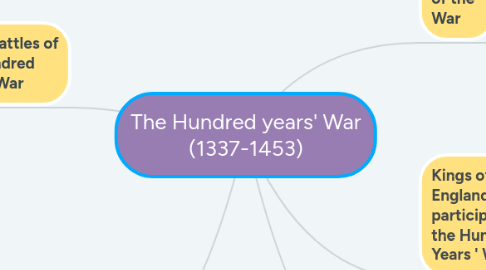The Hundred years' War (1337-1453)
by Татьяна Симонова

1. Major battles of the Hundred Years ' War
1.1. 1340, June 24-naval battle off the coast of Flanders, at the mouth of the Scheldt, English victory
1.2. 1346, August 26-Battle of Crecy. English victory
1.3. 1356, 19 September-Battle of Poitiers. English Victory
1.4. 1415, 25 October-Battle of Agincourt. English Victory
1.5. 1424, 17 August-battle of Verneuil on the southwestern border of Normandy. French Victory
1.6. 1429, May 8-lifting of the French siege of Orleans
1.7. 1450, April 10-battle of the village of Formigny. French victory
1.8. 1453, July 16-Battle of Chatillon. France's victory
2. Results of the Hundred Years ' War
2.1. - The French population has decreased by more than 65%; - England lost its continental possessions, which it had owned since 1269, except for the city of Calais and the surrounding area-The War of the Roses began in England - Improved methods of warfare
3. Causes of the War
3.1. The seizure of English-held Gascony (Aquitaine, south-west France) by Philip VI of France.
3.2. The expedition of Edward III to take by force territories in France, protect international trade and win booty and estates for his nobles.
3.3. The ambition of Charles V of France to remove the English from France's feudal territories.
3.4. The ambition of Henry V of England to legitimise his reign in England and make himself the king of France through conquest.
4. Kings of England, participants in the Hundred Years ' War
4.1. Edward III of Windsor (reigned 1327-1377) Richard II (1377-1399) Henry IV Bolingbroke (1399-1413) Henry V (1413-1422) Henry VI (1422-1461 and 1470-1471)
5. Kings of France, participants in the Hundred Years ' War
5.1. Philip VI the Lucky (reigned 1328-1350) John II the Good (1350-1364) Charles V the Wise (1364-1380) Charles VI the Mad (1380-1422) Charles VII the Victorious (1422-1461)


